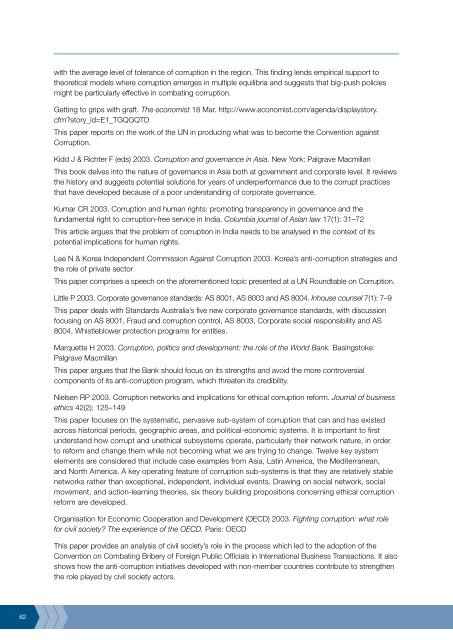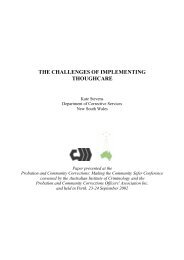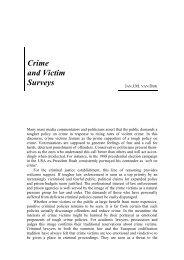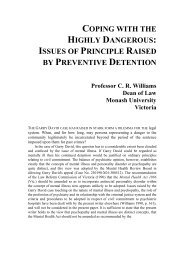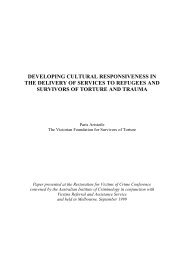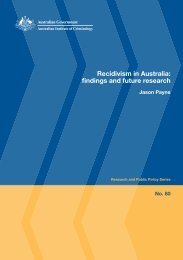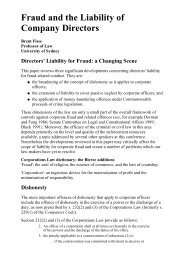Review of anti-corruption strategies Rob McCusker - Australian ...
Review of anti-corruption strategies Rob McCusker - Australian ...
Review of anti-corruption strategies Rob McCusker - Australian ...
You also want an ePaper? Increase the reach of your titles
YUMPU automatically turns print PDFs into web optimized ePapers that Google loves.
with the average level <strong>of</strong> tolerance <strong>of</strong> <strong>corruption</strong> in the region. This finding lends empirical support to<br />
theoretical models where <strong>corruption</strong> emerges in multiple equilibria and suggests that big-push policies<br />
might be particularly effective in combating <strong>corruption</strong>.<br />
Getting to grips with graft. The economist 18 Mar. http://www.economist.com/agenda/displaystory.<br />
cfm?story_id=E1_TGQGQTD<br />
This paper reports on the work <strong>of</strong> the UN in producing what was to become the Convention against<br />
Corruption.<br />
Kidd J & Richter F (eds) 2003. Corruption and governance in Asia. New York: Palgrave Macmillan<br />
This book delves into the nature <strong>of</strong> governance in Asia both at government and corporate level. It reviews<br />
the history and suggests potential solutions for years <strong>of</strong> underperformance due to the corrupt practices<br />
that have developed because <strong>of</strong> a poor understanding <strong>of</strong> corporate governance.<br />
Kumar CR 2003. Corruption and human rights: promoting transparency in governance and the<br />
fundamental right to <strong>corruption</strong>-free service in India. Columbia journal <strong>of</strong> Asian law 17(1): 31–72<br />
This article argues that the problem <strong>of</strong> <strong>corruption</strong> in India needs to be analysed in the context <strong>of</strong> its<br />
potential implications for human rights.<br />
Lee N & Korea Independent Commission Against Corruption 2003. Korea’s <strong>anti</strong>-<strong>corruption</strong> <strong>strategies</strong> and<br />
the role <strong>of</strong> private sector<br />
This paper comprises a speech on the aforementioned topic presented at a UN Roundtable on Corruption.<br />
Little P 2003. Corporate governance standards: AS 8001, AS 8003 and AS 8004. Inhouse counsel 7(1): 7–9<br />
This paper deals with Standards Australia’s five new corporate governance standards, with discussion<br />
focusing on AS 8001, Fraud and <strong>corruption</strong> control, AS 8003, Corporate social responsibility and AS<br />
8004, Whistleblower protection programs for entities.<br />
Marquette H 2003. Corruption, politics and development: the role <strong>of</strong> the World Bank. Basingstoke:<br />
Palgrave Macmillan<br />
This paper argues that the Bank should focus on its strengths and avoid the more controversial<br />
components <strong>of</strong> its <strong>anti</strong>-<strong>corruption</strong> program, which threaten its credibility.<br />
Nielsen RP 2003. Corruption networks and implications for ethical <strong>corruption</strong> reform. Journal <strong>of</strong> business<br />
ethics 42(2): 125–149<br />
This paper focuses on the systematic, pervasive sub-system <strong>of</strong> <strong>corruption</strong> that can and has existed<br />
across historical periods, geographic areas, and political-economic systems. It is important to first<br />
understand how corrupt and unethical subsystems operate, particularly their network nature, in order<br />
to reform and change them while not becoming what we are trying to change. Twelve key system<br />
elements are considered that include case examples from Asia, Latin America, the Mediterranean,<br />
and North America. A key operating feature <strong>of</strong> <strong>corruption</strong> sub-systems is that they are relatively stable<br />
networks rather than exceptional, independent, individual events. Drawing on social network, social<br />
movement, and action-learning theories, six theory building propositions concerning ethical <strong>corruption</strong><br />
reform are developed.<br />
Organisation for Economic Cooperation and Development (OECD) 2003. Fighting <strong>corruption</strong>: what role<br />
for civil society? The experience <strong>of</strong> the OECD. Paris: OECD<br />
This paper provides an analysis <strong>of</strong> civil society’s role in the process which led to the adoption <strong>of</strong> the<br />
Convention on Combating Bribery <strong>of</strong> Foreign Public Officials in International Business Transactions. It also<br />
shows how the <strong>anti</strong>-<strong>corruption</strong> initiatives developed with non-member countries contribute to strengthen<br />
the role played by civil society actors.


